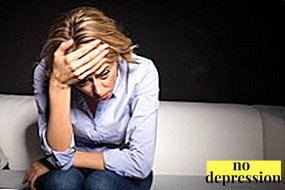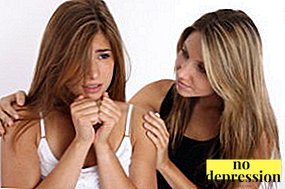It is common for each person to experience different emotions, which can be both positive and negative.
In particular, in certain adverse situations a person often has anxiety and worry. The reasons for this there can be a variety of, for example, stress, failures in the professional field, confusions in the family, various diseases.
Anxiety in this case is considered to be a fully justified reaction of the organism to an unfavorable situation, because nature itself is designed so that a person must react at the level of instincts to a potential danger.
However, some people more often than others are worried. In this case, it is customary to talk about increased tendency to develop anxiety.
What is anxiety and fear?

Anxiety, anxiety and fear - normal human emotions which each of us has ever experienced.
This is an adequate response of the human body to certain changes in its environment.
Mentally healthy person should experience a variety of emotions, including negative ones, which include internal anxiety and anxiety.
This is necessary in order to prepare yourself in advance for potential danger, to survive a stressful situation with the least loss, to live a full, vibrant life.
Anxiety and fear are feelings when a person unknowingly expects some kind of trouble or danger.
At the same time, there may be a decrease in attention, impaired concentration, a decrease in interest in the activity that used to cause positive emotions.
Often there are certain manifestations of anxiety, such as migraine, heart palpitations, worsening of mood, loss of appetite, insomnia. In rare cases, more serious symptoms of anxiety develop.
Psychology and psychosomatics of fear:
Symptoms of anxiety
Feelings of anxiety and worry manifested by different by symptomswhich are both psychological and physiological in nature. These signs include:
 Shivering in the body (most often there is tremor of the limbs).
Shivering in the body (most often there is tremor of the limbs).- Disruption of the digestive system (in particular, indigestion).
- Nausea, sometimes accompanied by sudden vomiting.
- Changes in stool (diarrhea).
- Frequent migraines (headache in this case is almost impossible to eliminate the use of painkillers).
- Pain and feeling of tension in the back.
- Disturbance of the heartbeat (the heart can "stop", or vice versa there is an increase in its rhythm).
- Numbness of the limbs, tingling in the hands or feet.
- Excessive perspiration.
- Redness of the skin (most often on the face).
- Increased body temperature.
- Reduced working capacity, fatigue.
- Violation of concentration and attention.
- Sleep disturbances (insomnia, or, conversely, excessive sleepiness).
- Irritability, capriciousness.
- Muscle tension.
- Violation of the frequency of urination (a person feels the need to empty the bladder, even when it is not full).
- Panic fear even before minor external stimuli (for example, when a person is frightened by any noise).
- Behavioral changes (eg, aggressiveness, cruelty, tearfulness).
Why does it occur?

It is believed that stress and the development of anxiety are mainly affected people of mature agebecause there are no reasons for concern for a child simply because he is surrounded by friends, relatives, loving parents, who always try to protect the crumbs from all sorts of trouble.
However, anxiety often occurs in children. The reasons for the development of anxiety in children and adults are the following general factors:
- genetic predisposition influencing the formation of a person’s character (in particular, overly emotional people are more prone to anxiety and feelings);
- wrong lifestyle;
- adverse environmental conditions;
- features of outlook and thinking.
Child anxiety | Adult anxiety |
|
|
Morning hangover

Often, during withdrawal from a person, not only a deterioration of the physiological state is observed, but also a feeling of anxiety and fear, even when there is no visible threat to his life and health.
This is due to some psychological and physiological factors.
In particular, being intoxicated, a person changes his behavior, becomes more relaxed, does not characteristic of his actions (often inadequate), for which he later becomes ashamed.
As a result, there is a well-founded concern. If a person does not remember what happened to him the day before, this only increases the feeling of fear and anxiety.
In addition, alcohol adversely affects all organs and systems of the body, causing intoxication, disruption of their work.
As a result the body receives a signal that it is in dangerand, as a result, anxiety occurs. This is especially true for those who abuse alcohol over a long period of time.
Often, anxiety and anxiety overwhelm a person after waking up (in the morning). The causes of this condition can be nightmares, upcoming serious business, unpleasant conversations or meetings that can not be avoided, financial problems, family troubles.
About alcohol and panic attacks in this video:
Constant anxiety

Anxiety and anxiety, if they occur from time to time, for example, when a potentially dangerous situation occursare the normal states of the human body.
If anxiety pursues a person constantly, it is a question of pathology.
So, constant fear and anxiety are symptoms of multiple mental disorderssuch as neurosis, schizophrenia, depressive state.
Some physiological abnormalities may also be accompanied by an increased degree of anxiety.
Thus, people suffering from hypertension, disorders of the thyroid gland, hormonal abnormalities, diabetes, heart disorders, often have a gratuitous fear which accompanies them over a long period of time.
Is anxiety possible without a reason?
Of course, some people are prone to anxiety and anxiety even in those moments when there is no real threat or stress.
In this case, the examination and the assistance of a specialist. After all, constant causeless anxiety may indicate the presence of certain psychological abnormalities or vegetative diseases of the body.
In this case, before fighting panic attacks, it is necessary to establish the exact cause, which led to the development of this state, and eliminate it.
Do I have to fight?

There is no unequivocal answer to the question asked, it all depends on the cause of concern and the frequency of development of anxiety.
So, if a person experiences a certain excitement, for example, before an important event, this is considered to be a completely normal state.
If anxiety pursues a person constantly, even for no apparent reason, treatment is necessary. Anxiety Therapy may be different.
In most cases required only change the conditions of life (for example, change jobs, if anxiety is associated with professional failures or conflicts in the team), provide yourself with good nutrition, adequate physical exertion, healthy sleep, give up bad habits.
In more severe cases, you will need to take special medication (tranquilizers, antidepressants), as well as psychological training and conversations with a psychologist.
Anxiety and anxiety arising in certain situations are conditions that inherent in any person, regardless of his emotionality. From time to time each of us experiences stress, worries about loved ones, worries about those or other problems.
This is perfectly normal for any mentally healthy person. However, if anxiety and fear pursue a person constantly, there is reason to think, because this may indicate that there are serious psychological or physiological problems.
In this case, you can not let the situation take its course (like self-medicating), need to see a specialist, and this should be done as early as possible.
Do I need to get rid of panic attacks? Find out from the video:

 Shivering in the body (most often there is tremor of the limbs).
Shivering in the body (most often there is tremor of the limbs).

